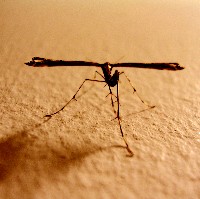3 November 2014. The Bill and Melinda Gates Foundation is awarding $156 million for a new type of malaria vaccine that prevents infection and transmission of the disease. Bill Gates, co-chair of the foundation, announced the grant to the Path Malaria Vaccine Initiative yesterday during keynote remarks at the American Society of Tropical Medicine and Hygiene’s annual meeting in New Orleans.
Malaria is caused by infections from the Plasmodium parasite transmitted by mosquitoes. In humans, the parasite multiplies in the liver, then infects red blood cells. Symptoms, including headache, fever, and vomiting, occur 10 to 15 days following transmission from a mosquito bite. World Health Organization says the disease occurs in nearly 100 countries, with some 207 million cases in 2012, causing 607,000 deaths.
Public health authorities generally focus on containing malaria, by protecting against or controlling mosquitoes, called vector control, with bed nets and spraying of mosquito breeding areas. The Gates Foundation says it wants to support a more aggressive effort leading to eradication of malaria, starting with more effective vaccines, which is the goal of the Path Malaria Vaccine Initiative.
A problem preventing effective control of malaria is the development of a natural immunity to the disease by people living in regions affected by malaria. While they may not show symptoms following infections, these immune individuals still host parasites and transmit them to mosquitoes, which in turn infect other people.
Ashley Birkett, director of Path, says in a statement from the organization, “Vaccines are likely to provide the best opportunity to complement drugs and vector-control measures in reducing transmission to zero, and they are the single most important intervention for preventing reintroduction.” The initiative says it aims to develop vaccines that both protect people against malaria infection from mosquitoes, as well as prevent mosquitoes from becoming infected with the parasite after feeding on a person with malaria, thus preventing further transmission.
Path plans to advance a vaccine candidate through early field trials, providing evidence for product development by 2017. The vaccine is expected to target the point in the Plasmodium life cycle, when the parasite is transitioning between human and mosquito hosts, which is also the point when the parasite is fewest in number. The vaccine, therefore, would induce immunity at the point where the parasite is most susceptible to attack, and for which it has no natural defenses.
The Path initiative says it will use a hybrid lab/clinical study it calls challenge trials, where healthy human volunteers test vaccines against a placebo under controlled lab conditions, taking advantage of malaria’s high cure rate if caught early. In challenge trials, the volunteers will be exposed to malaria parasites to assess the efficacy and safety of the vaccines, while being closely monitored by medical staff. If signs of infection occur, the volunteers can be treated quickly. Monoclonal antibodies — engineered, highly targeted molecules — will also be developed to validate target antigens in the challenge trials.
The $156 million to Path Malaria Vaccine Initiative is part of a $500 million commitment announced by Gates at the New Orleans meeting. Gates told the audience his foundation is increasing its malaria program budget by 30 percent to more than $200 million per year.
News of the malaria grant at the American Society of Tropical Medicine and Hygiene (ASTMH) meeting was largely overshadowed by the state of Louisiana’s travel and quarantine restrictions on meeting attendees from regions where Ebola is occurring. In a 30 October statement the organization said it does not agree with the state’s policy. “ASTMH firmly believes,” says the statement, “the single best way to safeguard Americans and the world is to end the epidemic in West Africa with the help of our best-trained, brave men and women.”
Read more:
- Ebola-Marburg Vaccine Development, Testing Contract Awarded
- U.S. Patent Awarded for Freeze-Dried Vaccine Formulation
- PBS to Air Documentary on Vaccine Attitudes and Disease
- Ebola Vaccine Safety Trials Scheduled in U.S., U.K., Africa
- Dengue Vaccine Shown to Cut Infections, Hospitalizations
* * *


 RSS - Posts
RSS - Posts
You must be logged in to post a comment.